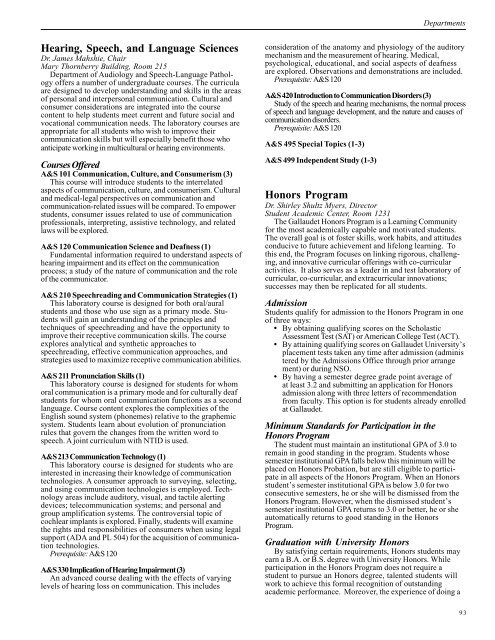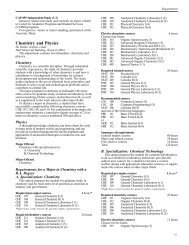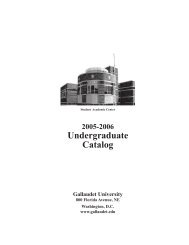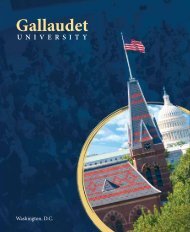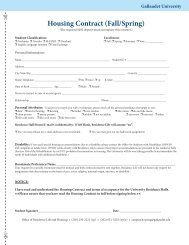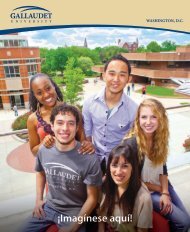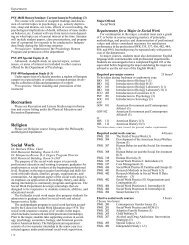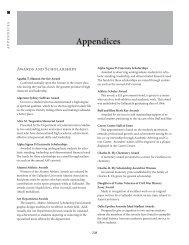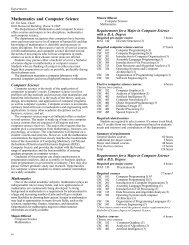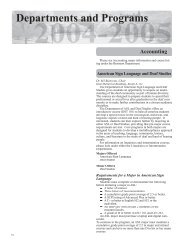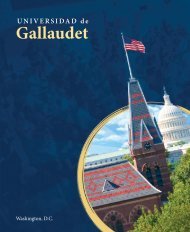Hearing, Speech, and Language Sciences Honors Program
Hearing, Speech, and Language Sciences Honors Program
Hearing, Speech, and Language Sciences Honors Program
You also want an ePaper? Increase the reach of your titles
YUMPU automatically turns print PDFs into web optimized ePapers that Google loves.
Departments<br />
<strong>Hearing</strong>, <strong>Speech</strong>, <strong>and</strong> <strong>Language</strong> <strong>Sciences</strong><br />
Dr. James Mahshie, Chair<br />
Mary Thornberry Building, Room 215<br />
Department of Audiology <strong>and</strong> <strong>Speech</strong>-<strong>Language</strong> Pathology<br />
offers a number of undergraduate courses. The curricula<br />
are designed to develop underst<strong>and</strong>ing <strong>and</strong> skills in the areas<br />
of personal <strong>and</strong> interpersonal communication. Cultural <strong>and</strong><br />
consumer considerations are integrated into the course<br />
content to help students meet current <strong>and</strong> future social <strong>and</strong><br />
vocational communication needs. The laboratory courses are<br />
appropriate for all students who wish to improve their<br />
communication skills but will especially benefit those who<br />
anticipate working in multicultural or hearing environments.<br />
Courses Offered<br />
A&S 101 Communication, Culture, <strong>and</strong> Consumerism (3)<br />
This course will introduce students to the interrelated<br />
aspects of communication, culture, <strong>and</strong> consumerism. Cultural<br />
<strong>and</strong> medical-legal perspectives on communication <strong>and</strong><br />
communication-related issues will be compared. To empower<br />
students, consumer issues related to use of communication<br />
professionals, interpreting, assistive technology, <strong>and</strong> related<br />
laws will be explored.<br />
A&S 120 Communication Science <strong>and</strong> Deafness (1)<br />
Fundamental information required to underst<strong>and</strong> aspects of<br />
hearing impairment <strong>and</strong> its effect on the communication<br />
process; a study of the nature of communication <strong>and</strong> the role<br />
of the communicator.<br />
A&S 210 <strong>Speech</strong>reading <strong>and</strong> Communication Strategies (1)<br />
This laboratory course is designed for both oral/aural<br />
students <strong>and</strong> those who use sign as a primary mode. Students<br />
will gain an underst<strong>and</strong>ing of the principles <strong>and</strong><br />
techniques of speechreading <strong>and</strong> have the opportunity to<br />
improve their receptive communication skills. The course<br />
explores analytical <strong>and</strong> synthetic approaches to<br />
speechreading, effective communication approaches, <strong>and</strong><br />
strategies used to maximize receptive communication abilities.<br />
A&S 211 Pronunciation Skills (1)<br />
This laboratory course is designed for students for whom<br />
oral communication is a primary mode <strong>and</strong> for culturally deaf<br />
students for whom oral communication functions as a second<br />
language. Course content explores the complexities of the<br />
English sound system (phonemes) relative to the graphemic<br />
system. Students learn about evolution of pronunciation<br />
rules that govern the changes from the written word to<br />
speech. A joint curriculum with NTID is used.<br />
A&S 213 Communication Technology (1)<br />
This laboratory course is designed for students who are<br />
interested in increasing their knowledge of communication<br />
technologies. A consumer approach to surveying, selecting,<br />
<strong>and</strong> using communication technologies is employed. Technology<br />
areas include auditory, visual, <strong>and</strong> tactile alerting<br />
devices; telecommunication systems; <strong>and</strong> personal <strong>and</strong><br />
group amplification systems. The controversial topic of<br />
cochlear implants is explored. Finally, students will examine<br />
the rights <strong>and</strong> responsibilities of consumers when using legal<br />
support (ADA <strong>and</strong> PL 504) for the acquisition of communication<br />
technologies.<br />
Prerequisite: A&S 120<br />
A&S 330 Implication of <strong>Hearing</strong> Impairment (3)<br />
An advanced course dealing with the effects of varying<br />
levels of hearing loss on communication. This includes<br />
consideration of the anatomy <strong>and</strong> physiology of the auditory<br />
mechanism <strong>and</strong> the measurement of hearing. Medical,<br />
psychological, educational, <strong>and</strong> social aspects of deafness<br />
are explored. Observations <strong>and</strong> demonstrations are included.<br />
Prerequisite: A&S 120<br />
A&S 420 Introduction to Communication Disorders (3)<br />
Study of the speech <strong>and</strong> hearing mechanisms, the normal process<br />
of speech <strong>and</strong> language development, <strong>and</strong> the nature <strong>and</strong> causes of<br />
communication disorders.<br />
Prerequisite: A&S 120<br />
A&S 495 Special Topics (1-3)<br />
A&S 499 Independent Study (1-3)<br />
<strong>Honors</strong> <strong>Program</strong><br />
Dr. Shirley Shultz Myers, Director<br />
Student Academic Center, Room 1231<br />
The Gallaudet <strong>Honors</strong> <strong>Program</strong> is a Learning Community<br />
for the most academically capable <strong>and</strong> motivated students.<br />
The overall goal is ot foster skills, work habits, <strong>and</strong> attitudes<br />
conducive to future achievement <strong>and</strong> lifelong learning. To<br />
this end, the <strong>Program</strong> focuses on linking rigorous, challenging,<br />
<strong>and</strong> innovative curricular offerings with co-curricular<br />
activities. It also serves as a leader in <strong>and</strong> test laboratory of<br />
curricular, co-curricular, <strong>and</strong> extracurricular innovations;<br />
successes may then be replicated for all students.<br />
Admission<br />
Students qualify for admission to the <strong>Honors</strong> <strong>Program</strong> in one<br />
of three ways:<br />
●<br />
By obtaining qualifying scores on the Scholastic<br />
Assessment Test (SAT) or American College Test (ACT).<br />
●<br />
By attaining qualifying scores on Gallaudet University’s<br />
placement tests taken any time after admission (adminis<br />
tered by the Admissions Office through prior arrange<br />
ment) or during NSO.<br />
●<br />
By having a semester degree grade point average of<br />
at least 3.2 <strong>and</strong> submitting an application for <strong>Honors</strong><br />
admission along with three letters of recommendation<br />
from faculty. This option is for students already enrolled<br />
at Gallaudet.<br />
Minimum St<strong>and</strong>ards for Participation in the<br />
<strong>Honors</strong> <strong>Program</strong><br />
The student must maintain an institutional GPA of 3.0 to<br />
remain in good st<strong>and</strong>ing in the program. Students whose<br />
semester institutional GPA falls below this minimum will be<br />
placed on <strong>Honors</strong> Probation, but are still eligible to participate<br />
in all aspects of the <strong>Honors</strong> <strong>Program</strong>. When an <strong>Honors</strong><br />
student’s semester institutional GPA is below 3.0 for two<br />
consecutive semesters, he or she will be dismissed from the<br />
<strong>Honors</strong> <strong>Program</strong>. However, when the dismissed student’s<br />
semester institutional GPA returns to 3.0 or better, he or she<br />
automatically returns to good st<strong>and</strong>ing in the <strong>Honors</strong><br />
<strong>Program</strong>.<br />
Graduation with University <strong>Honors</strong><br />
By satisfying certain requirements, <strong>Honors</strong> students may<br />
earn a B.A. or B.S. degree with University <strong>Honors</strong>. While<br />
participation in the <strong>Honors</strong> <strong>Program</strong> does not require a<br />
student to pursue an <strong>Honors</strong> degree, talented students will<br />
work to achieve this formal recognition of outst<strong>and</strong>ing<br />
academic performance. Moreover, the experience of doing a<br />
93
Departments<br />
Senior <strong>Honors</strong> Project can prepare students for graduate or<br />
professional-level work.<br />
A B.A. or B.S. degree “with University <strong>Honors</strong>” will be<br />
granted to students with a minimum GPA of 3.4 who complete<br />
the following <strong>Honors</strong> requirements with a grade of B or better:<br />
●<br />
Six credits in <strong>Honors</strong> Seminars.<br />
●<br />
Fifteen credits in <strong>Honors</strong> work from the general<br />
education requirements.<br />
● Nine credits of additional <strong>Honors</strong> work.<br />
●<br />
Participation in an off-campus academic program, such<br />
as the Cooperative Internship <strong>Program</strong> or the consortium.<br />
●<br />
Completion of a Senior <strong>Honors</strong> Thesis or Project.<br />
<strong>Honors</strong> Course Offerings<br />
<strong>Honors</strong> course offerings fall into three categories:<br />
●<br />
<strong>Honors</strong> Sections of general education courses: These<br />
sections, limited to <strong>Honors</strong> students, meet general<br />
education requirements or elective requirements.<br />
Sometimes linked, they are more dem<strong>and</strong>ing than<br />
regular sections in terms of content <strong>and</strong> performance<br />
required.<br />
●<br />
<strong>Honors</strong> Option (H-option): <strong>Honors</strong> students may earn<br />
<strong>Honors</strong> credit for a regular course by contracting with<br />
the instructor (with approval of the <strong>Honors</strong> Director)<br />
to complete more challenging <strong>and</strong> indepth work than in<br />
the regular course.<br />
●<br />
<strong>Honors</strong> Seminars: These courses provide an interdisci<br />
plinary approach to topics. Each student will complete<br />
a research project. Guest lecturers <strong>and</strong> off-campus<br />
excursions are common features of the seminars.<br />
Topics vary.<br />
<strong>Honors</strong> <strong>Program</strong> Courses Offered<br />
HON 300 <strong>Honors</strong> Seminar (2-3)<br />
An interdisciplinary study of a given topic. The topic will<br />
be examined from the viewpoint of a variety of academic<br />
disciplines. Through readings <strong>and</strong> discussions, students<br />
investigate various aspects of an issue. Although one<br />
professor will coordinate the course, there will be frequent<br />
guest lecturers <strong>and</strong> field trips where appropriate. Topics vary<br />
each semester.<br />
Prerequisite: Admission to the University <strong>Honors</strong> <strong>Program</strong>,<br />
or special permission of the instructor <strong>and</strong> <strong>Honors</strong> director.<br />
Additional prerequisites may be required for given topics.<br />
HON 487 Preparation for Senior <strong>Honors</strong> Project (2)<br />
Intensive development of an approved idea for a project<br />
conducted under the supervision of a project director. While<br />
the prime example of a project is a thesis, other projects<br />
include a creative work, technical innovation, or other work<br />
of originality, depth, <strong>and</strong> rigor that prepares the student for<br />
graduate or professional work. Successful completion of the<br />
course requires submission of a project proposal acceptable to<br />
the project director, a second advisor, <strong>and</strong> the <strong>Honors</strong> Council.<br />
May count toward requirements for the major with permission of<br />
the department.<br />
Prerequisites: Good st<strong>and</strong>ing in the University <strong>Honors</strong><br />
<strong>Program</strong>, junior/senior status, permission of appropriate<br />
department(s), <strong>and</strong> permission of the <strong>Honors</strong> Council.<br />
HON 488 Senior <strong>Honors</strong> Project (4)<br />
Completion of project proposed in HON 487. Modification<br />
of the project may be made with the consent of the project<br />
director, a second advisor, <strong>and</strong> the <strong>Honors</strong> Council. Successful<br />
completion of the course requires approval by the <strong>Honors</strong><br />
Council, the project director, <strong>and</strong> a second advisor. May<br />
count toward requirements for the major with permission of<br />
the department.<br />
Prerequisites: Good st<strong>and</strong>ing in the University <strong>Honors</strong><br />
<strong>Program</strong>, senior status, permission of appropriate departments,<br />
permission of the <strong>Honors</strong> Council, <strong>and</strong> successful<br />
completion of HON 487.<br />
HON 495 Special Topics (1-3)<br />
In-depth study on special topics, current issues, or areas<br />
of interest not included in other courses <strong>and</strong> not necessarily<br />
interdisciplinary as <strong>Honors</strong> Seminars are.<br />
Prerequisites: Permission of the <strong>Honors</strong> Director. Additional<br />
prerequisites may be required for given topics.<br />
HON 499 Independent Study (1-3)<br />
Intensive supervised study <strong>and</strong> research on topics of the<br />
student’s selection.<br />
Prerequisites: Permission of the <strong>Honors</strong> Director. Additional<br />
prerequisites may be required for given topics.<br />
Interpretation<br />
Dr. Valerie L. Dively, Chair<br />
Dawes House<br />
The Department of Interpretation prepares interpreters to<br />
interact <strong>and</strong> communicate fluently with deaf, hard of hearing,<br />
<strong>and</strong> hearing people, with an appreciation of diversity in deaf<br />
<strong>and</strong> hearing communities.<br />
Interpretation Courses Offered<br />
ITP 660 Practical Skills for Interpreter Educators (1)<br />
This course is designed for interpreter educators who<br />
would like to develop or enhance their skills in teaching<br />
interpreting. Basic approaches to learning theory will be<br />
introduced. The emphasis of this course is on development<br />
of specific skills used in teaching the cognitive tasks<br />
associated with interpreting <strong>and</strong> the evaluation of those<br />
skills. This course is not included in the major.<br />
ITP 661 ASL Intralingual Skills for Interpreters (1)<br />
This course is designed for interpreters or future interpreters<br />
who would like to develop their American Sign <strong>Language</strong><br />
(ASL) skills. Underst<strong>and</strong>ing the source message when it is in<br />
ASL is a crucial skill often overlooked in interpreter education.<br />
The exercises deal with ASL only. Topics include finding<br />
the main point, abstracting, prediction skills, finding key<br />
signs, rephrasing, <strong>and</strong> text analysis. Also included will be<br />
exercises on simple <strong>and</strong> complex ASL utterances. This course<br />
is not included in the major.<br />
Prerequisite: Good comm<strong>and</strong> of ASL<br />
ITP 695 Special Topics (1-3)<br />
Italian<br />
Please see Italian course listing under the Foreign <strong>Language</strong>s,<br />
Literatures, <strong>and</strong> Cultures Department.<br />
Latin<br />
Please see Latin course listing under the Foreign <strong>Language</strong>s,<br />
Literatures, <strong>and</strong> Cultures Department.<br />
94


